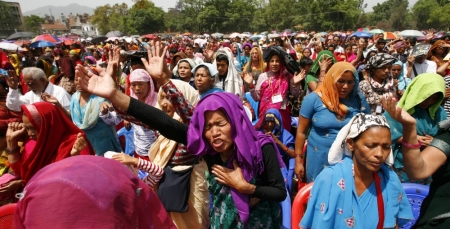Christian Leaders in Nepal Demand Law Criminalizing Evangelism Be Struck Down

Christian leaders in Nepal have submitted a petition to the government demanding that a new law banning evangelism and religious conversions be struck down.
"Christians have been cheated in the past with assurances that have never been put into practice," said C.B. Gahatraj, president of the Christian Federation of Nepal.
"We are not just going to be used as vote banks as in the past," he added, according to an article in Asia News on Tuesday.
"We demand an immediate amendment to the law to ensure freedom of conversion and choice. Everyone is free to choose their faith and practice it."
Gahatraj warned that legislation signed by President of Nepal Bidhya Devi Bhandari in October targets religious men and women who want to evangelize and share their faith.
Catholic Vicar General Fr. Shilas Bogati said that Christians, who only make up 1.4 percent of the country's population, want the same respect as other faith groups.
"The State cannot impose itself on the free practice of the Christian faith," Bogati said.
"Some religious fundamentalists are spreading rumors in which they dream of a South Asia that is a Hindu region," he continued. "This is impossible. Religious freedom for all, including for Christians, has to be guaranteed not only in words but also in practice."
Dinesh Bhattarai, advisor to the prime minister, reportedly promised to address the concerns of Christians before the upcoming federal and provincial elections in November and December.
Human rights groups, such as Christian Solidarity Worldwide, have warned that the criminal code legislation in question could send believers to prison for up to five years if found guilty of forcefully converting people.
"We are deeply saddened that this bill is now law," said Pastor Tanka Subedi, founding member and chair of Dharmik Chautari Nepal and Religious Liberty Forum Nepal, last month.
"Our appeals to the president and other policy makers to amend this have been ignored. Nepali government have taken a regressive step as this law severely restricts our freedom of expression and our freedom of religion or belief."
Gahatraj told The Christian Post in an interview back in January that Christianity is growing in the Asian nation, but said that believers there face major hardships, such as not being allowed to bury their dead.
The general secretary of the Federation of National Christians told CP that in some cases the remains of dead Christians have even been dug up from the ground and dumped at the homes of their relatives, or left out on the streets.
"When Christians die in Nepal, they have two pains. One is they suffer, they grieve because of their loved ones who are no more; secondly, they have no place to bury their loved ones," Gahatraj told CP.
"If Hindus find Christians buried in their area, they force Christians to dig them out from the graveyard, and bury the bodies in another place."
Christians have also been arrested and sentenced for practicing "violence and witchcraft," such as the case of four recently released Nepalis who were held for nine months for praying with a mentally ill woman.
"The imprisonment of these Christians should have never taken place as the facts of their innocence were clear," said Nate Lance, International Christian Concern's advocacy manager.
"This is a step in the right direction for religious freedom in Nepal, but there is still much work to be done. No one should fear imprisonment for the free expression and practice of their religion."





















